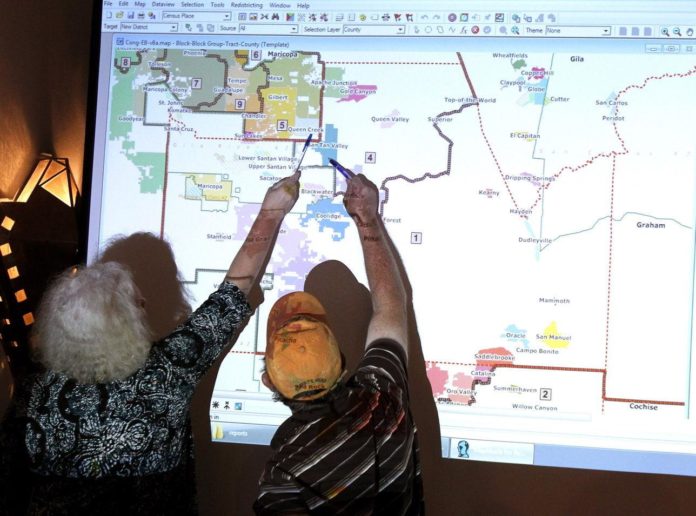
A judge has rejected an effort by Democratic leaders of the Arizona Legislature to disqualify two of five independents chosen by a judicial panel as potential chairs of a commission that will redraw political district boundaries next year.
The lawsuit filed last week by House Minority Leader Charlene Fernandez and Senate Minority Leader David Bradley alleged the state Commission on Appellate Court Appointments failed to do its duty under the state constitution to properly vet the candidates.
They wanted the judge to order the nominating commission to replace the two nominees with qualified people and halt selection of the other four members of the redistricting commission. They said one nominee wasn’t qualified because he is a lobbyist and the other was a Trump supporter who was not truly independent.
Maricopa County Superior Court Judge Janice Crawford on Thursday denied the Democrats’ request to halt the process. She said they waited too long to ask a court to step in.
The suit was filed after Republican House Speaker Rusty Bowers made his choice for the commission last week, picking David Mehl of Pima County to serve as one of two Republicans on the panel.
Bowers’ pick set up a series of choices by the other leaders of the House and Senate, which must come a week apart under a provision of the state constitution that created the Arizona Independent Redistricting Commission. Democrats were trying to put that timeline on hold so two new independents could be chosen.
The judge said she would not alter the timeline, which is in the state constitution.
“The public interest will not be furthered by the Court creating confusion into the constitutionally mandated deadlines or the possibility of removing a properly appointed member by restarting the process of submitting a pool of qualified applicants,” Crawford wrote.
After the court ruling, Fernandez chose Shereen Lerner of Tempe to serve on the redistricting commission. She is an anthropology and archaeology professor at Mesa Community College and has served as a volunteer on numerous advisory boards for Tempe.
The redistricting commission was created by voters in 2000 to limit political influence by taking the job of redrawing congressional and legislative district maps from the Legislature. The process that follows each U.S. Census is politically important because where districts’ lines are drawn can influence what voices are heard and how loudly in the political debate, partly by limiting how many legislative and U.S. House seats each party can realistically win.
The commission is designed to have five members — two Democrats, two Republicans, and an independent, who serves as chair. The state Commission on Appellate Court Appointments, led by Supreme Court Chief Justice Robert Brutinel, vets the candidates and presents a list of 10 Democrats and 10 Republicans to leaders of the House and Senate.
The four leaders then choose one member each from the list, and those four commissioners pick the chair from another list of five qualified candidates the judicial screening panel provides. The chair often serves as a tiebreaker.
The next picks come from Republican Senate President Karen Fann and Bradley.
Republished with the permission of the Associated Press.












